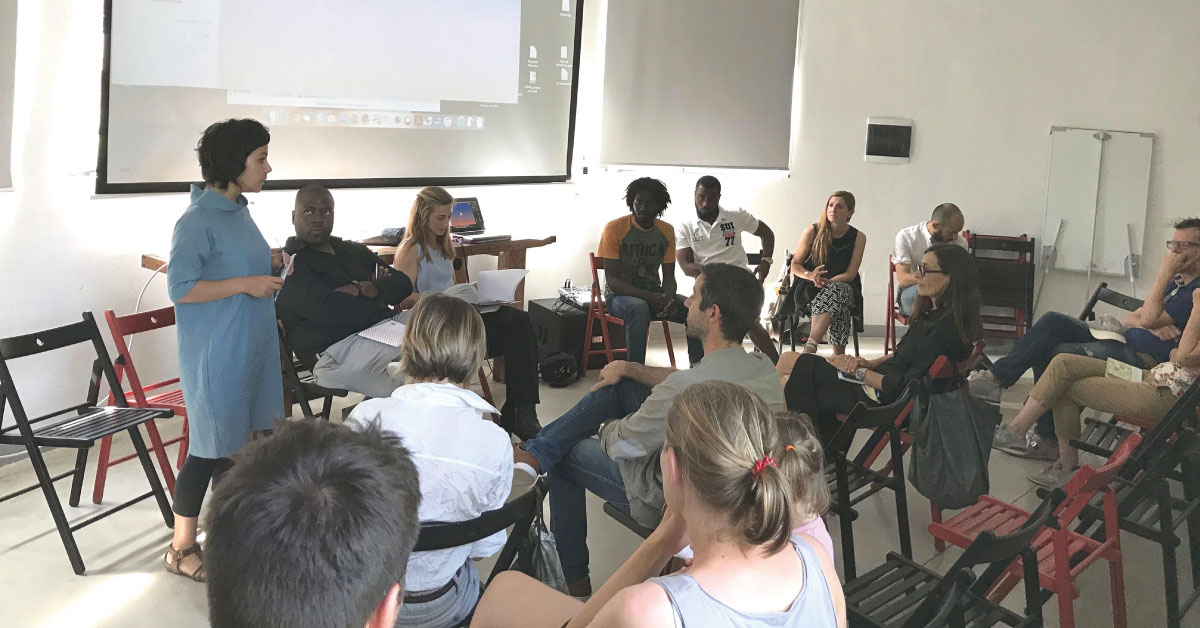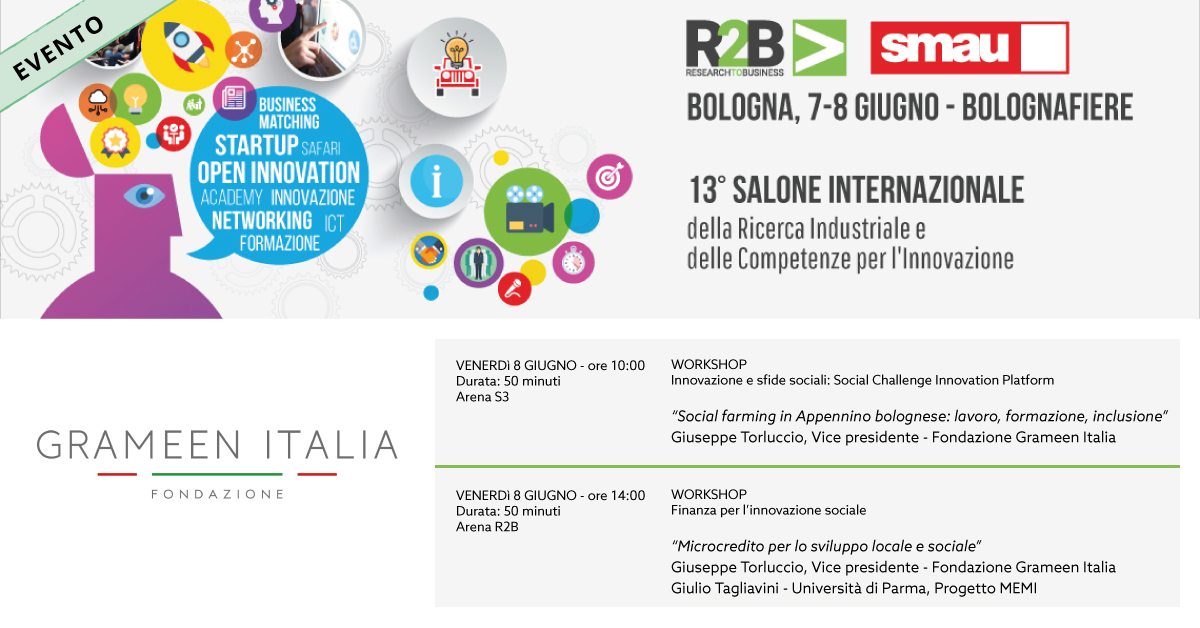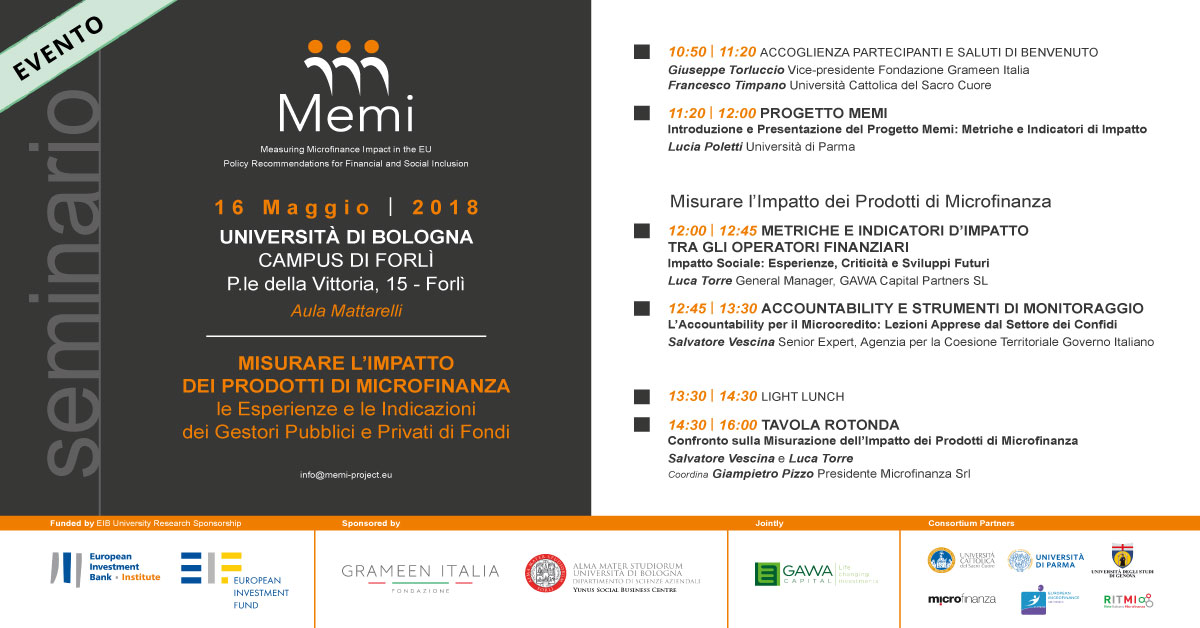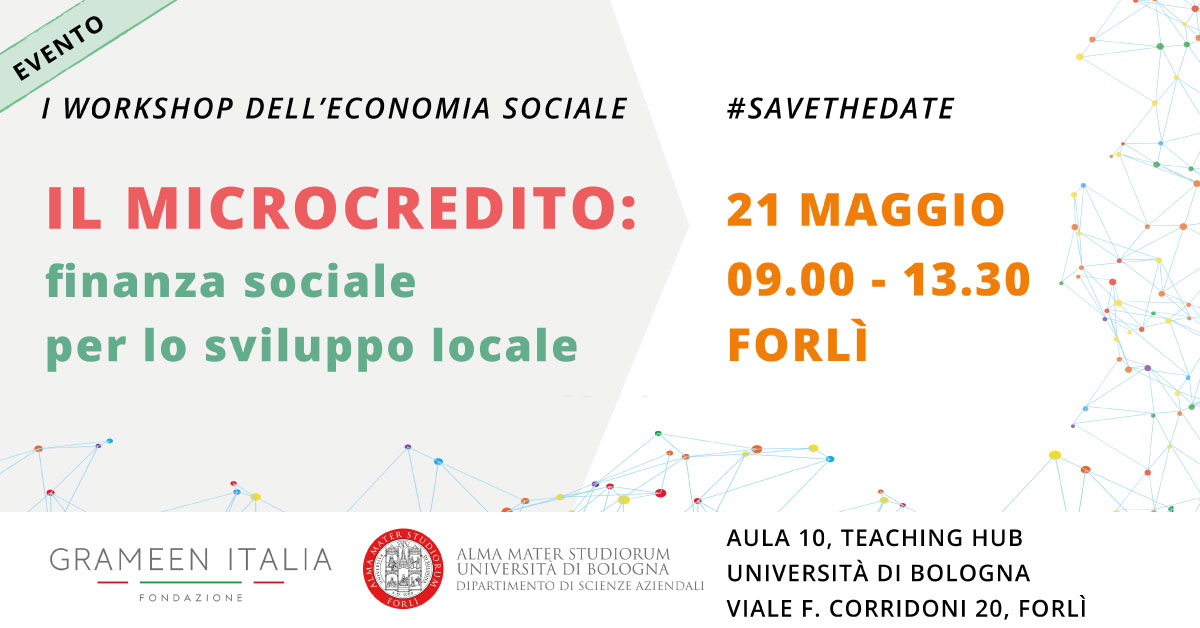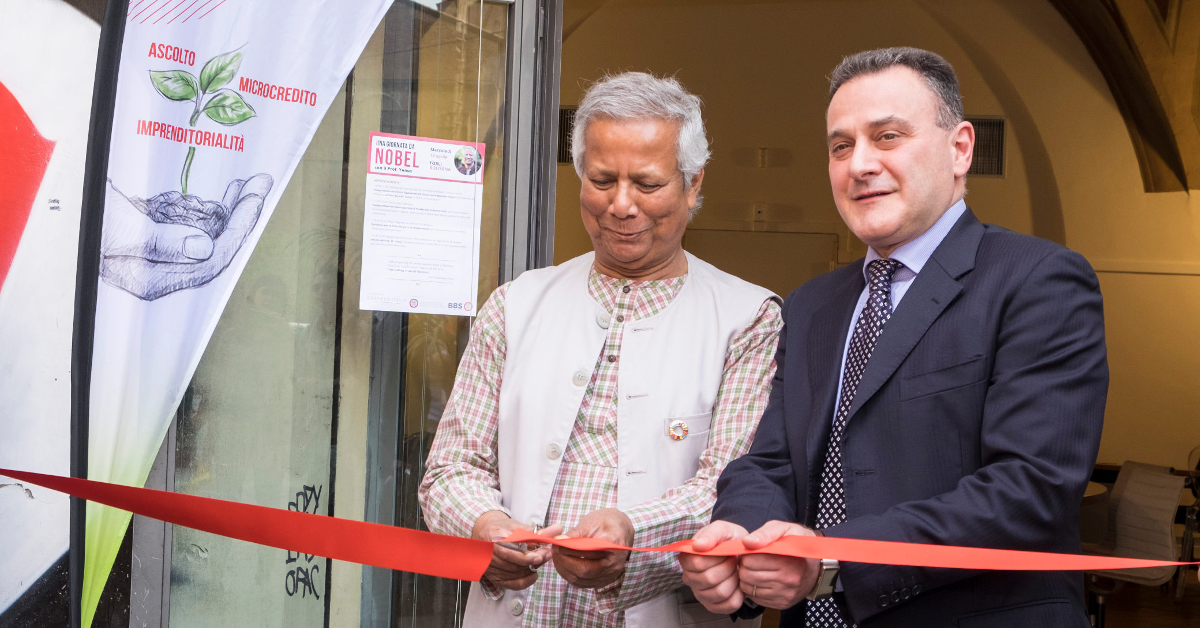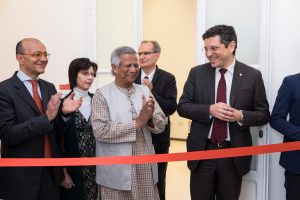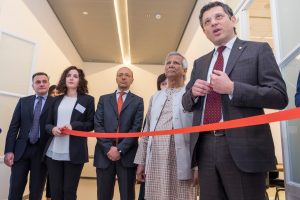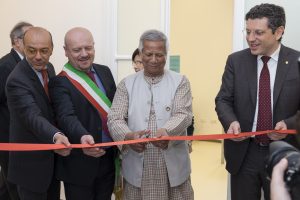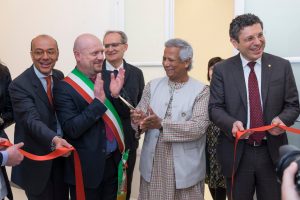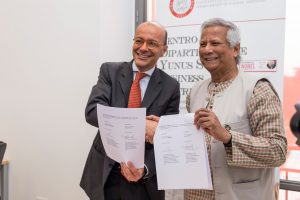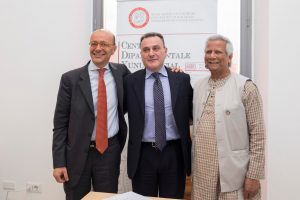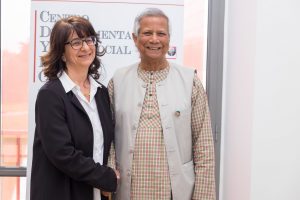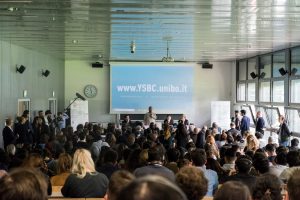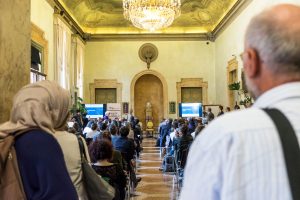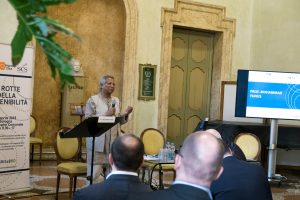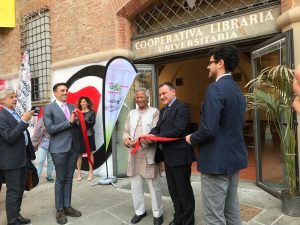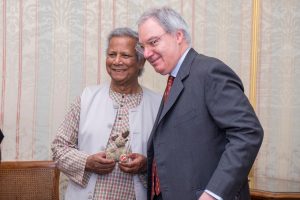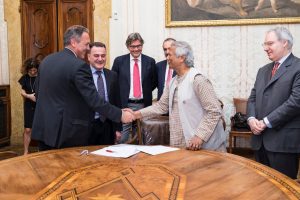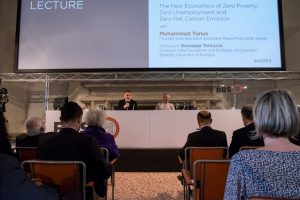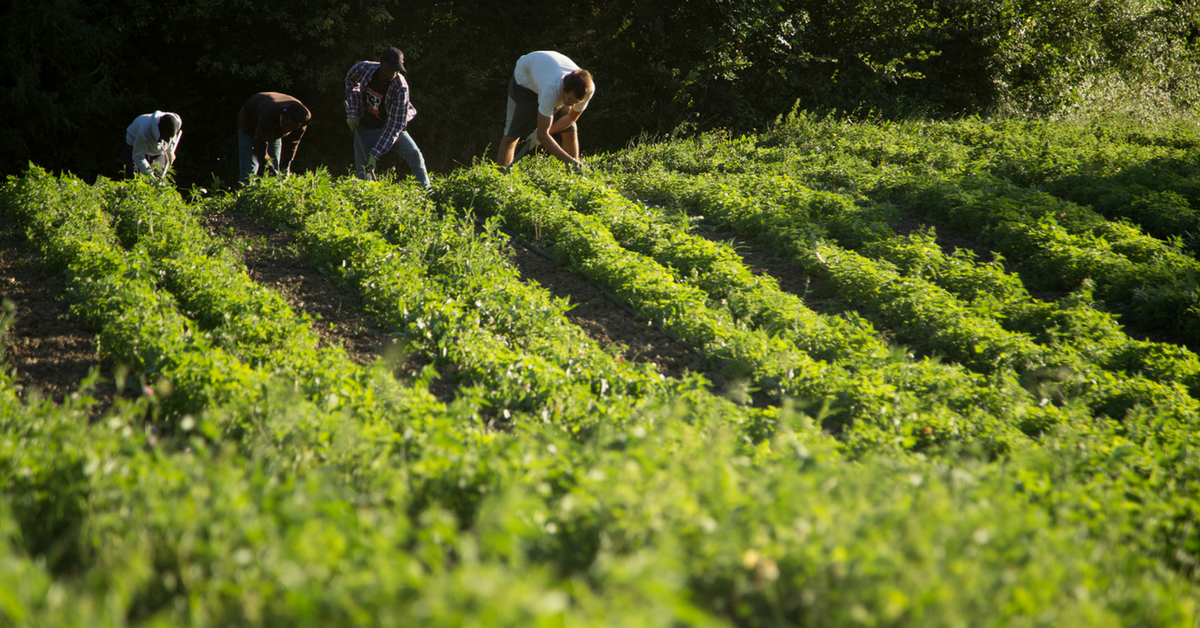Economy and Finance: what a fear! To overcome it you need some smart training.
It is coming to an end the first edition of the “Financial Education Month“, the initiative promoted by the Italian Ministry of Economic Development aimed at raising awareness and informing Italians of all ages about the advantages given by a conscious management of their finances.
Over two hundred activities have been carried out on the national territory: the “World Investor Week” has inaugurated the calendar of events, which ends today on the occasion of the 94th “World Savings Day“.
Promoting financial education: why? As shown by the data, Italians do not demonstrate to possess the basic economic knowledge that other European citizens have on average. Yet the so-called “financial illiteracy” exposes personal assets to greater risks and makes it more difficult to take appropriate and far-sighted decisions.

For example: how can a young professional save for his or her third age…if he or she doesn’t know how to?
Education, information, responsibility: in Grameen Italia this is how we develop our training activity, combining the principles suggested by Prof. Muhammad Yunus and the European Union.
The recent Bank of Italy study, implemented in collaboration with the OECD, helps to understand the urgency of acting on the Italian economic knowledge system. From the survey, the Italian level of financial literacy appears to be lower than the average of the G20 countries: we total 3.5 points out of 7, unlike the 4.3 points of other countries.
Furthermore, the research shows that only 37% of Italians correctly understand the basic financial concepts, compared to 52% of the European average.
On the front of savings, the survey conducted by Acri-Ipsos reports that a large number of Italians are inclined to save on their finances (86%), but it also reveals that for 65% “to save” means paying attention to unnecessary expenses and to waste. Italians, therefore, tend to consider savings as “prudence in spending”, rather than the act of “setting aside” their finances.
In fact, experts argue that in most cases savings are unintentional (as an effect of moderation in purchases) and not strategic (as it would be if they planned to save to reach a future goal).
Therefore the data describe Italians as capable of accumulating finances, but still poorly educated on what are the best tools to do so, as confirmed by the Bank of Italy survey.
We can improve on the front of financial instruments and in the management of personal and family budgets, and it is to these issues that Grameen Italia devotes attention during training and financial education activities, in order to promote virtuous economic behaviors and encourage entrepreneurship.
The “CRIB” project begins: a business incubation path for migrant people
The incubation path CRIB – to CReate, to Include, to Build designed by Kilowatt kicked off on October 1st: it is aimed at supporting and developing the entrepreneurial skills of migrant people.
Now starting in the scouting phase of the participants, CRIB provides a six-month program to be articulated in training, incubation, tutoring and networking activities for the development of business ideas.
At the end of the experience, the participants determined to become entrepreneurs will be oriented towards the best forms of financing suitable to start their business.
The route begins in October with two workshops addressed to the social workers active in the field of job placement, about the enhancement of soft skills in disadvantaged people.
In December, the training sessions addresses to the migrant people will be dedicated to the definition of the entrepreneurial idea and will begin at “Le Serre dei Giardini Margherita”. The sessions will be followed by a focus on the definition of the business model and on the sustainability of the project.
The program is implemented by the Kilowatt team in collaboration with the project partners and foresees, in the phases following the incubation, the involvement of tutors for the start-up of the companies.
In fact, CRIB wants to make participation the driving principle of the program, to create with future entrepreneurs an urban ecosystem animated by public and private subjects that collaborate on a territorial basis, engaged in reception.
“In a historical period when the phenomenon of migration is mainly told in terms of emergencies, CRIB intends to propose a different narration of the present. In fact, the project wants to work in the supply chain with the local actors to support and give strength to ideas that create work and widespread wellbeing for the community” describes Kilowatt.
CRIB was born within the European Initiative “Social Challenge – From Job Seekers to Job Creators“, with the participation and support of Fondazione Grameen Italia, and coordinated in Italy by Aster.
Promoter of the initiative is Meta Group, which, thanks to the support of the European BIC Network (EBN) and Impact Hub partners, has implemented the European Social Challenges Innovation Platform.
Grameen Italia Foundation at the “R2B – Research to Business 2018” Exhibition
On Friday 8th June 2018 we are going to intervene in two workshops at the “R2B – Research to Business”, the 13th edition of the International Exhibition on Industrial Research and Skills for Innovation that will be held in Bologna (Fair District – Hall 33).
At 10 am, at Arena S3, our Vice-president Prof. Giuseppe Torluccio will give a speech about “Social Business as a stimulus for local development” during the workshop “Innovation and social challenges: the Social Challenge Innovation Platform”.
More specifically, this represents the opportunity to tell the winning projects of the “Social Farming in the Apennines” challenge, that participated in the European initiative which is the discussion topic of the workshop.
📌 At 2 pm the debate will focus on social finance. Prof. Torluccio and Prof. Giulio Tagliavini of the University of Parma – spokesperson of the MEMI Project – will discuss of “Microcredit for local and social development”, in the framework of the workshop “Finance for social innovation” to be held at Arena R2B.
R2B – Research to Business 2018
13th International Exhibition of Industrial Research and Skills for Innovation
7-8 June 2018 – Bologna, Fair District – Hall 33
R2B – Research to Business is an opportunity to discover technological and social innovations, to deepen European and Italian policies for competitiveness, research and development and to actively participate in laboratories and workshops.
The exhibition will focus on:
- Industry 4.0 and digital innovation;
- Circular economy and climate change;
- Skills and creativity;
- Big Data for Industry;
- Social innovation and Sharing Economy;
- 30 years of Cohesion;
- Open Innovation and Start-Up;
- Urban Regeneration.
R2B is promoted by the Emilia-Romagna Region and BolognaFiere, in collaboration with ASTER and SMAU.
Seminar “Measuring the impact of microfinance products”
The seminar entitled “Measuring the impact of microfinance products: the experiences and indications of public and private fund managers” will take place on Wednesday 16 May at the Aula Mattarelli of the Campus of Forlì of the University of Bologna.
The event is organized by Microfinanza Srl and promoted by Fondazione Grameen Italia and the Yunus Social Business Centre of the University of Bologna.
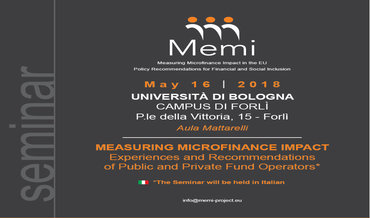
The seminar will be introduced by the intervention of Prof. Giuseppe Torluccio, Vice President of our Foundation, and by Prof. Francesco Timpano of the Università Cattolica del Sacro Cuore.
Followed by the presentation of the project “MEMI – Measuring Microfinance Impact“ by Prof. Lucia Poletti of the University of Parma, the speech “Social impact: experiences, criticalities and future developments” by Luca Torre, General Manager of GAWA Capital Partners SL and the speech “Accountability for microcredit: lessons learned from the trust sector” by Salvatore Vescina, Senior Expert of the Agency for Territorial Cohesion of the Italian Government.
The seminar will end with a round table coordinated by the President of Microfinanza SL Giampietro Pizzo.
We are waiting for you starting from 10.50 in Piazzale della Vittoria, 15 in Forlì, Aula Mattarelli.
At this link the seminar program in English.
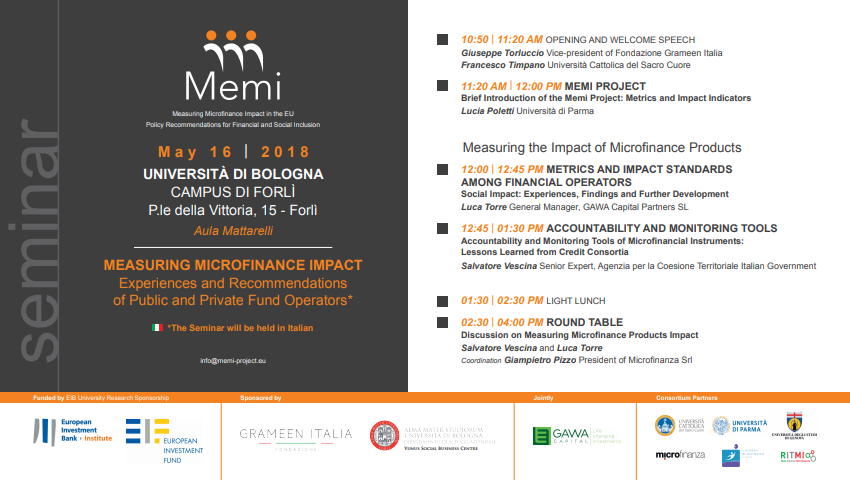
Workshop “Microcredit: social finance for local development”
How can microcredit be a tool for local development? How does it respond to the economic and social revitalization needs of certain territories?
On Monday 21 May in Forlì we will answer these questions, exploring the characteristics of microcredit and telling some Italian experiences, during the workshop “Microcredit: social finance for local development“.
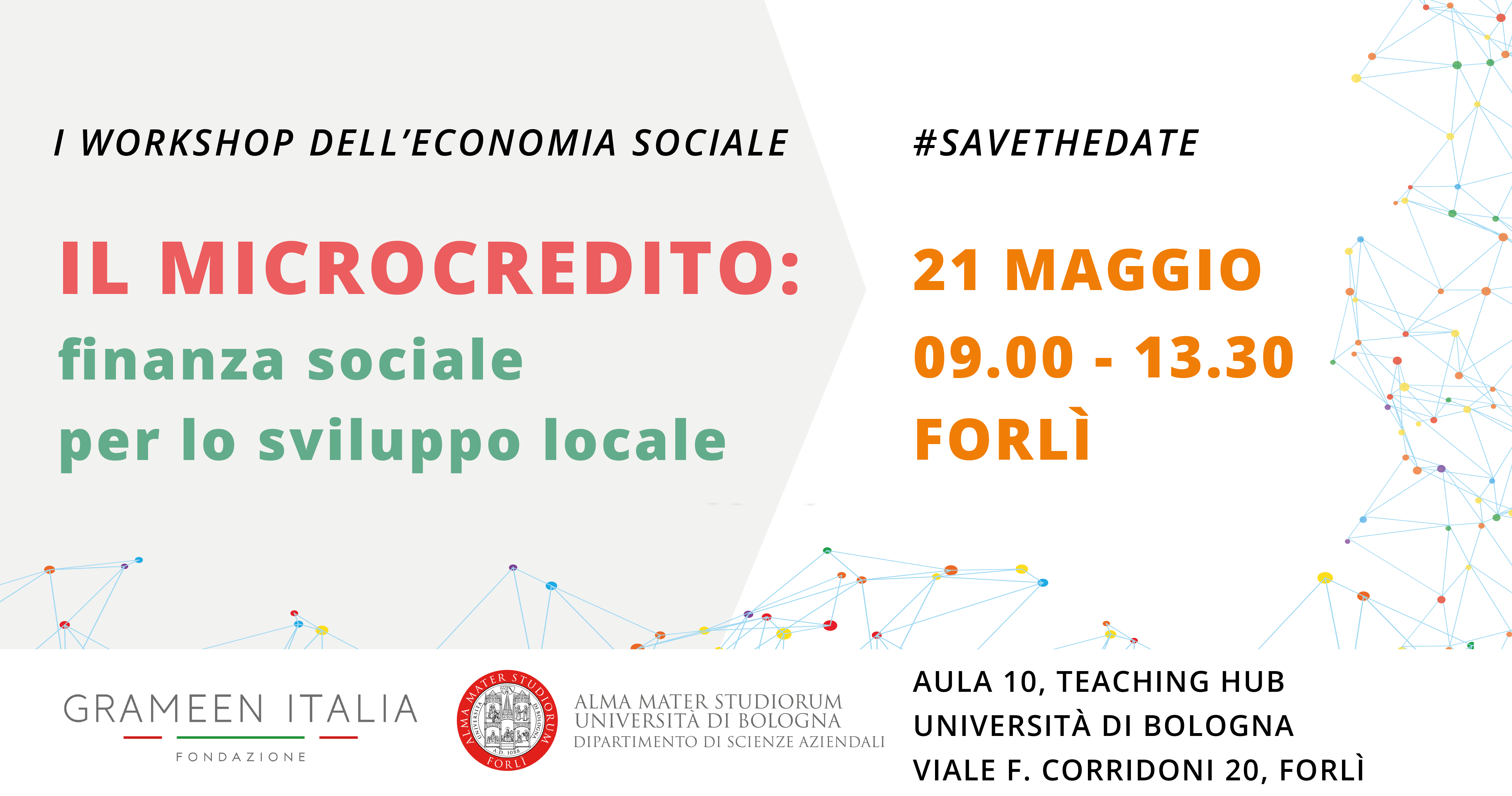
The workshop, which will be held at the Teaching Hub of the Campus of Forlì of the University of Bologna from 09.00 to 13.30, aims to illustrate the multidimensional nature of microcredit through the evidence of those who contribute in various ways to the development and dissemination of this tool for the financial inclusion.
PROGRAM
09.00 – 09.30 Registration of participants
Chair: Giuseppe Torluccio, Yunus Social Business Center, Fondazione Grameen Italia
09.30 – 10.00 Institutional greetings and opening of the workshop
Massimo Spisni, Department of Business Sciences, Campus of Forlì, University of Bologna
Federica Bandini, Master’s Degree in Management of Social Economy, University of Bologna
Luisa Brunori, Win Win Association
10.00 – 10.15 Micro-financial public policies
Giovanni Nicola Pes, National Entity for Microcredit
10.15 am – 11.30 am Microcredit: origins, development and future prospects
H.I. Latifee, Grameen Trust
Giorgia Bonaga, Fondazione Grameen Italia
Giulio Tagliavini, MEMI Project – University of Parma
11.30 – 13.00 Microcredit for local development
Emanuele Sentimenti, Bper Banca
Paul S.A. Crabtree, Social Impact Banking Project, UniCredit, Milan
Gian Paolo Commissari, Banca Etica
Francesca Francese, PerMicro Bologna
13.00 – 13.15 Closing of the works – Questions and answers.
Light lunch.
To participate in the event, we kindly invite you to register.
During the morning the MEMI Project – Measuring the Impact in Microfinance will be presented, which will also be examined in depth during a seminar dedicated to it that will take place on Wednesday 16 May at the Teaching Hub in Forlì. More information here.
The meeting on May 21 “Microcredit: social finance for local development” is part of the “Social Economy Workshops” organized by the Master’s Course in Management of Social Economy of the Department of Management at the University of Bologna, in collaboration with AICCON.
The workshop is promoted and organized by Fondazione Grameen Italia in collaboration with the Yunus Social Business Centre of the University of Bologna and the Master’s Course in Management of Social Economy of the Department of Management at the University of Bologna.
The Yunus Social Business Centre is the new departmental research center of the University of Bologna dedicated to the study and research on Social Business and on economic models capable of generating social benefit and shared value.
The Center was inaugurated on April 18 2018 in the prestigious presence of Prof. Muhammad Yunus, visiting Forlì and Bologna for the day dedicated to Social Business promoted by the Grameen Italy Foundation in collaboration with the University of Bologna and the Bologna Business School. To deepen the interventions of Prof. Yunus we have reported here the chronicle of the day. Instead, to find out what Social Business is and explore its origins, we recommend this brief reading.
We look forward to seeing you on Monday 21st May!
For more information, write to info@grameenitalia.it.
Story of a Nobel day with Professor Yunus
“Every time I see a problem, I invent a new business to solve it. I invent a business different from the conventional ones, where the focus is not about profit but where everything is dedicated to solving people’s problems.“
It is with these words that Prof. Yunus introduces the uniqueness of Social Business, turning to a packed classroom of students gathered at the Forlì Campus of the University of Bologna to attend his Lecture. It was April 18 and the “banker of the poor” was visiting Forlì and Bologna on the day dedicated to the theme of Social Business promoted by the Fondazione Grameen Italia in collaboration with the University of Bologna and Bologna Business School.
Prof. Yunus arrived in the city of Forlì in the morning for the inauguration of the first Yunus Social Business Centre of the University of Bologna.
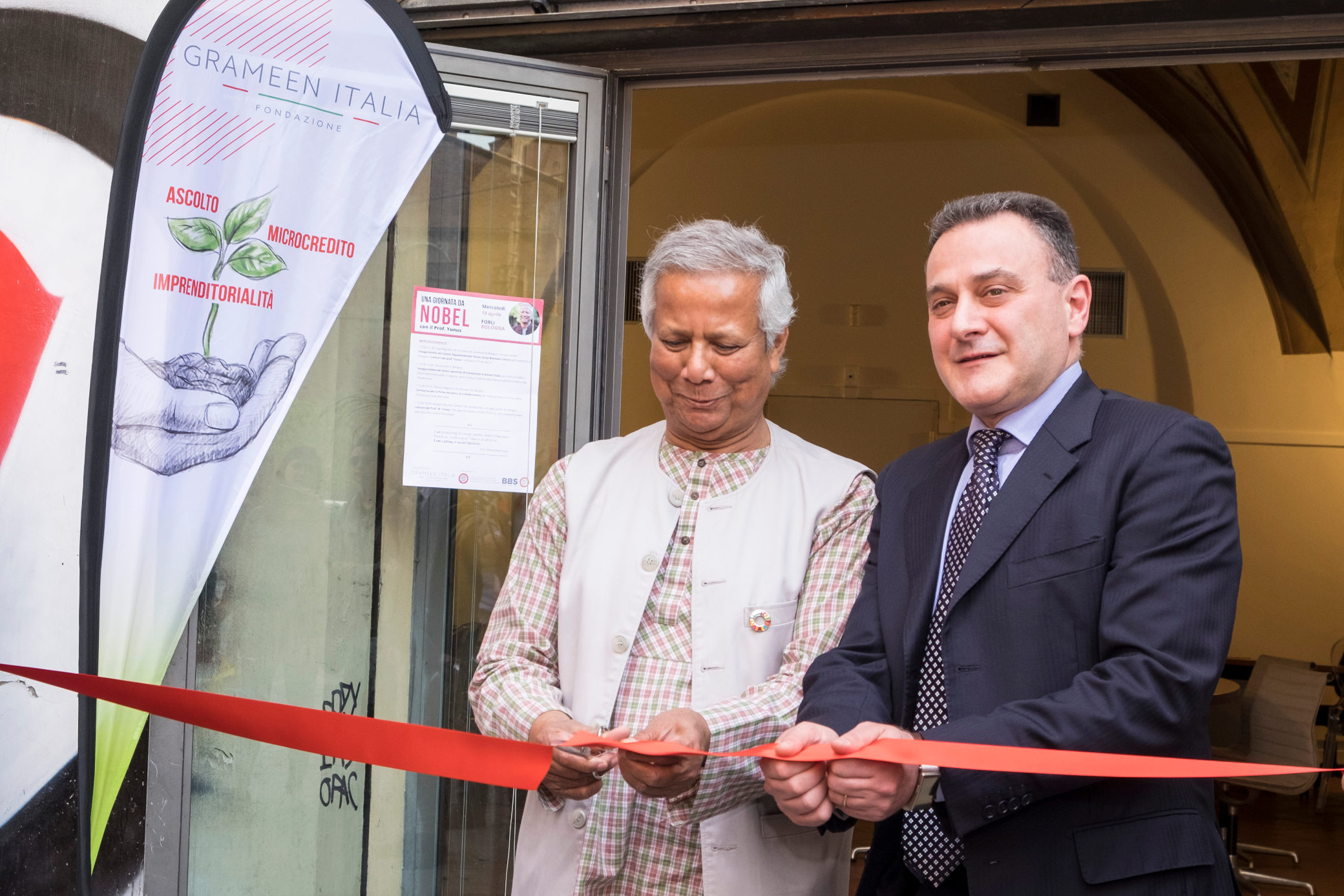
The ribbon-cutting ceremony was introduced by the words of the magnificent Rector Francesco Ubertini and the Director of the Department of Management Maurizio Sobrero, accompanied by the greetings of the Mayor of Forlì Davide Drei, in the presence of the Coordinator of the Master’s Degree Course in Management of the Social Economy Federica Bandini, of the Campus Director of Forlì Felix San Vicente Santiago and of our Vice President of the Grameen Italia Giuseppe Torluccio.
The activities of the Yunus Social Business Centre will concern the research on economic and business models with a social vocation, the publication, and dissemination of study results, and the collaboration with the international network of the Yunus Centres for joint research and publications. Not least, it will be an expression of the common will to make scientific disclosure on this issue.
For example, did you know that the famous Grameen Bank, the “bank of the poor”, is itself a Social Business?
In his speech to the students, to explain the differences with other forms of capitalist enterprise and the characteristic social vocation of the Social Business model, Yunus cited other cases of Social Business in the world, remembering how much work there is still to be done to raise awareness and to involve economic subjects and political decision-makers on the subject of business as a healthy carrier of social advantage.
In fact, the invitation that Yunus has been addressing for years to the various players in the economy, finance, and politics is to design a new economic system capable of providing truly inclusive and direct services to all sections of the population, without excluding the most disadvantaged.
As he recalled during the Lecture in Forlì, the current financial system has led to an unfair and unjust concentration of wealth in the hands of a handful of people: there is, therefore, the need to reform the economic system, also in light of the failure of the traditional capitalist system on the front of reducing social inequalities and environmental risks.
Yunus also underlined the urgent need to update training in the business-economic field, which is now stale of references to outdated models, promoting future entrepreneurs to reflect on business theories and practices capable of generating social benefit.
An urgency to which the Forlì educational center of the University of Bologna responds with a wide range of courses in social economy.
Finally, on the subject of job search, Yunus has so kindly provoked the young men and women present: “Why are you looking for a job? Who told you to get a job? Did your teachers ask you for a job? Do your books ask you for a job? (…) The idea of work has gone out of fashion!“. And on this statement, the audience broke into a short laugh.
“Work was invented in the last century but somehow it is a concept still in use. Try to tell yourself, every day, when you wake up in the morning: I’m not a “job seeker”, I’m a “job creator”. (…) Be independent, be free!“
Prof. Yunus then arrived in Bologna at 12.30 to greet with a brief speech the guests of the CSR and Social Innovation Exhibition, gathered in the Foyer of the Teatro Comunale, and to inaugurate the new counter for microcredit and self-entrepreneurship of the Fondazione Grameen Italia in Piazza Verdi 2.
Hosted in the spaces of the University of Bologna, the help desk is intended as a place to listen to the business ideas of young people, both students and non-students, to carry out business start-up activities.
At the end of the rich morning, Yunus met Unicredit at the prestigious Palazzo Magnani in Via Zamboni 20 to seal the collaboration agreement between the bank and the Fondazione Grameen Italia for the launch of a program to support micro-enterprises through the microcredit tool . The agreement is part of the Social Impact Banking initiative, a program that represents Unicredit’s commitment to contribute to the development of a more equitable and inclusive society, through the identification, financing, and promotion of initiatives that have a positive social impact.
Our “Nobel Day” ended with a second lecture by Prof. Yunus entitled “The New Economics of Zero Poverty, Zero Unemployment, and Zero Net Carbon Emission“, moderated by our Vice President Prof. Giuseppe Torluccio and held at the Bologna Business School.
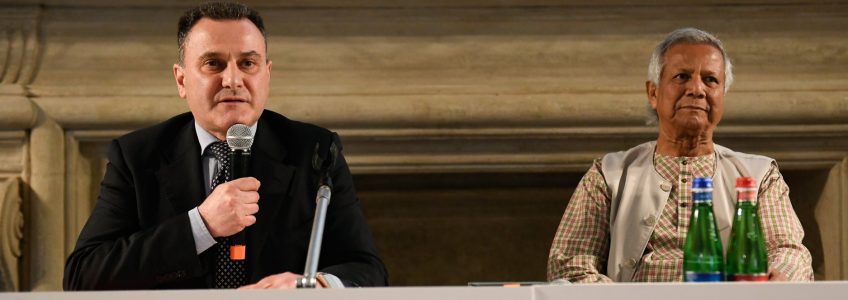
Once again, talking about microcredit, Yunus explained and motivated the social aims of Social Business.
More than thirty-five years have passed since his first loan of 27 US dollars granted to produce bamboo furniture to a group of women from the village of Jobra (Bangladesh). Since then, the microcredit system has spread to reach over 100 countries in the world, serving more than 9 million clients. An innovation, that of microcredit, which has been able to overcome the boundaries of the rural areas in which it was born and to become part of the instruments of microfinance and social finance, in Europe and Italy.
“I want you to keep in mind that if you continue to follow the same old rules, you will always go to the same destinations,” concluded Prof. Yunus “If instead you want to reach new destinations, you must establish new rules that will be in complete opposition to the old ones.“
Photos by Sara Santoro
A Nobel day: the 18th of April Prof Yunus will return to Bologna and Forlì
On Wednesday, April 18th the Nobel Peace Prize Prof. Muhammad Yunus will give two public lectures in occasion of a Social Business and Microcredit event promoted by Grameen Italia Foundation in collaboration with the University of Bologna and the Bologna Business School.
The two lectures will focus on Social Business and on social oriented firms.
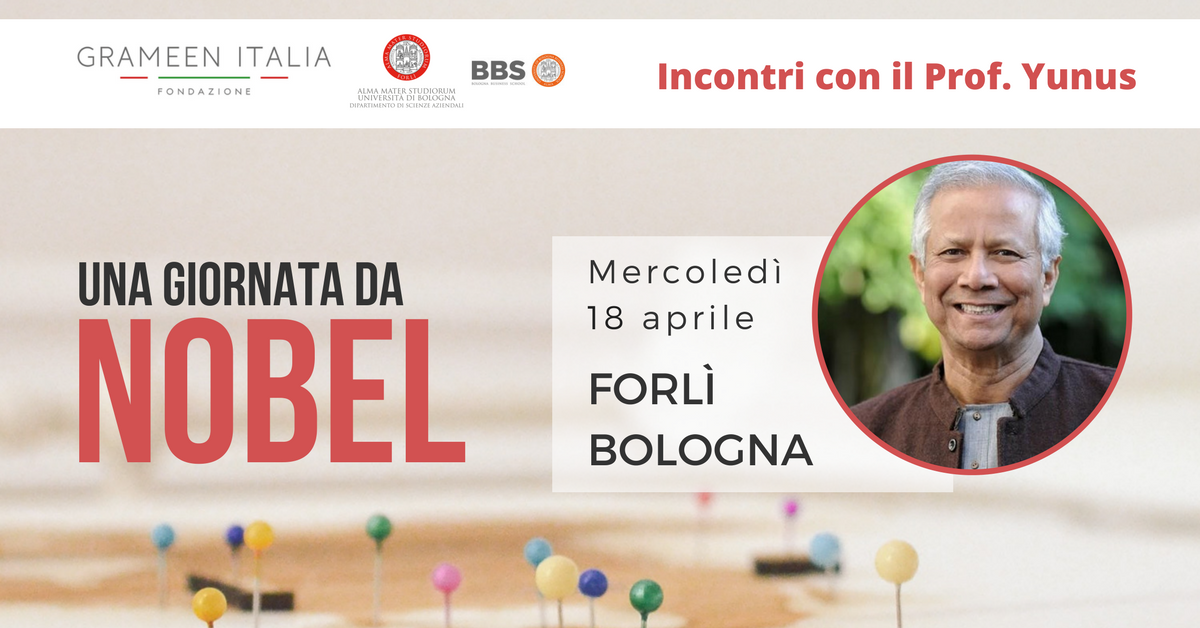
According to Yunus, it is time to admit that the capitalistic system is failing and that in the current situation, it brings inevitably strong inequalities, unemployment and environmental destruction. To save humanity and the planet, we need a new economic system grounded on a more realistic vision of the human nature which recognizes altruism and generosity as leading forces as fundamental and powerful as self-interest.
📌 BRIEFLY: THE APPOINTMENTS OF THE DAY
- 10:00-11:30 am: Forlì, Teaching Hub (Via Corridoni, 20 – University of Bologna, Forlì Campus).
Inauguration of the Research Department Center “Yunus Social Business Center” of the Bologna University and public Lecture “A World of Three Zeros”.
- 12:30-12:45 pm: Bologna, Piazza Verdi n.2.
Inauguration of the new Grameen Italia Foundation office for microcredit and self-entrepreneurship. It will follow: citizenship greetings.
- 12:45-01:15 pm: Bologna, Palazzo Magnani, Via Zamboni 20.
Ceremony for the signing of the partnership agreement between Unicredit and Grameen Italia Foundation.
- 03:00 to 04:30 pm: Bologna, Bologna Business School, Villa Guastavillani, Via degli Scalini, 18.
Lecture by Prof. M. Yunus: “The New Economics of Zero Poverty, Zero Unemployment, and Zero Net Carbon Emissions”.
📌 THE PROGRAMM
The agenda begins at 10:00am with the launch of the first Yunus Social Business Centre of the University of Bologna in Forlì; since many years the city represents a focal point of international relevance as part of social economics also thanks to the stable and solid presence of the university.
At the ceremony will take part the Rector, Francesco Ubertini, the Director of Corporate Science Department, Maurizio Sobrero and the representative of the most important local entities.
The Yunus Social Business Centre will be devoted to the promotion and the diffusion of Social Business research both in the academic and in the professional area, involving young students and researchers. The activities in the Centre will concern researches on economic and corporate models with a social vocation, the publication and dissemination of the results, the development of PhD researches and the academic partnership with the Yunus Centre Network for researches and shared publications.
Yunus will arrive in Bologna, the city where he received the honorary citizenship, at 12:30 pm for the inauguration of the new counter/office from Grameen Italia Foundation for microcredit and self-entrepreneurship at Piazza Verdi n.2.
The office will be hosted within the spaces of the Bologna University and it will represent a referral point for new entrepreneurial initiatives directed to young university students, citizens and new entrepreneurs.
At 12:45 pm Yunus will meet Unicredit to sign the partnership agreement between UniCredit and Grameen Italia at Palazzo Magnani in Via Zamboni, 20, to start a supporting program for microfirm through the microcredit tool. The agreement is part of the initiative Social Impact Banking, a program that represents the commitment of Unicredit in helping to develop a more equal and inclusive society, through identification, financing and promotion of activities that bear a positive social impact.
The day will end with a public lecture from prof. Yunus titled “The New Economics of Zero Poverty, Zero Unemployment, and Zero Net Carbon Emissions” at Bologna Business School in Villa Guastavillani from 03:00 to 04:30 pm.
Grameen Italia Foundation will wait for you in this important day that we hope it would happily continue the story which tied Yunus to Bologna in the last fourteen years. Indeed, the first meeting with the city occurred in 2004 two years before he received the Nobel prize, in occasion of the conferment to Yunus of the Honoris Causa Degree in Education Sciences at Alma Mater Studiorum with the Rector Pier Ugo Calzolari. In 2015, Yunus has received the honorary citizenship of the city of Bologna.
Who won the “Social Farming in the Apennines” challenge?
Last December Social Farming in the Apennines was closed: it is the first call for proposals launched by Grameen Italia Foundation to be inspired by the Social Farm Model.
At the end of February, three projects were announced to be the winners of the 30,000 euro grant each, and they all have been presented by individual companies, cooperatives and non-profit associations from the hills and mountains surrounding Bologna.
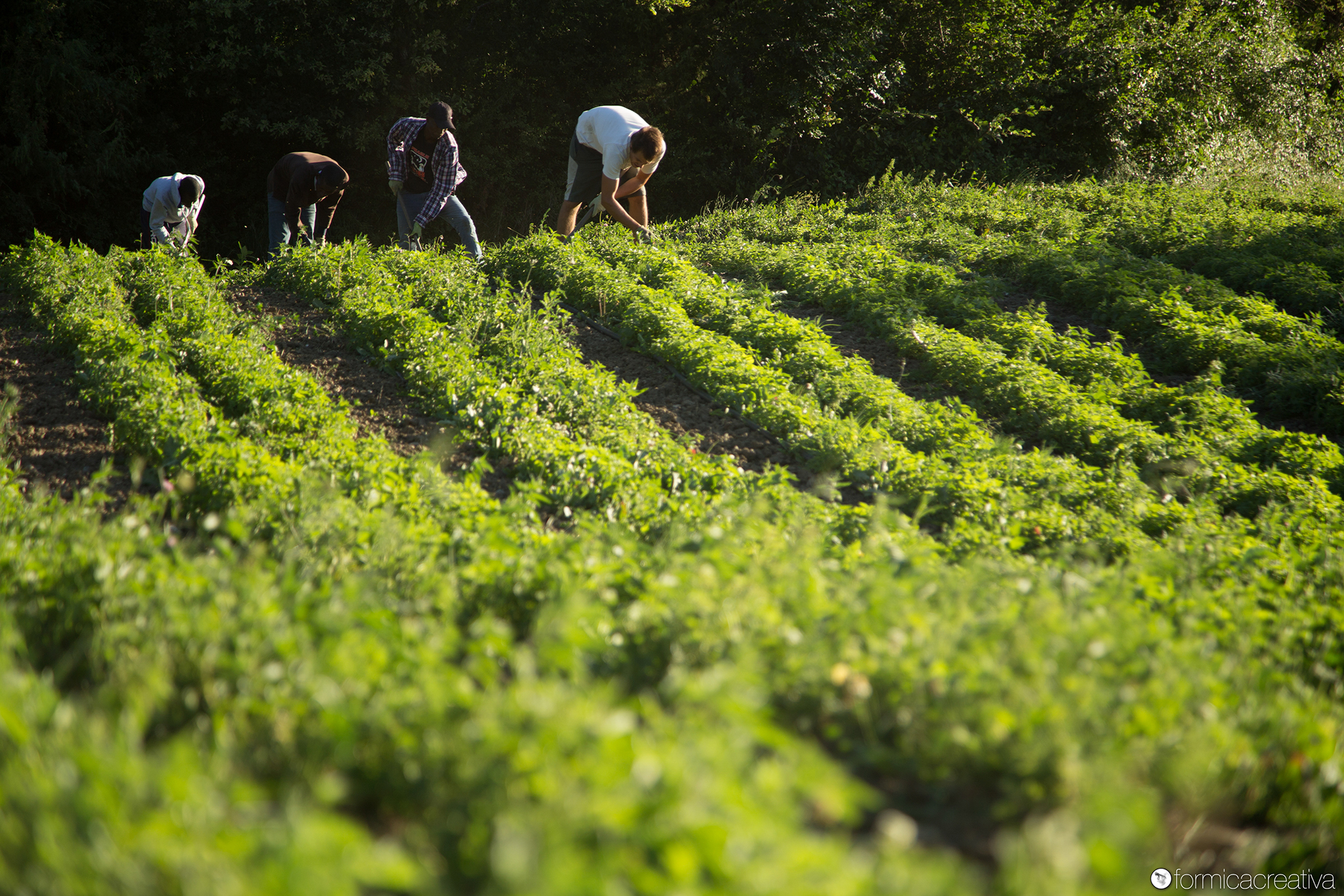
The projects propose a social business model capable of offering training and work to disadvantaged people, protecting the territory with organic farming, helping the development of social and economic networks who are already active in rural areas at risk of depopulation and abandonment.
As our Social Farm Model suggests, these social business initiatives have the potential to act in the market for the benefit of the territory, supporting with their activities the economic processes and welfare interventions already implemented by public authority and companies.
The call for projects has been launched precisely for this reason: to financially support agriculture with a social purpose, which is virtuous because it is capable of achieving the social-working inclusion of disadvantaged people and of actively contributing to the revitalization of the Bolognese Apennines economy.
The projects will start in April and May 2018, when the six-month pilot phase will start. Fondazione Grameen Italia will support projects with a support and monitoring programm.
The “Social farming in the Apennines” call was promoted within the framework of the European Social Challenges Innovation Platform with the support of Aster, collecting the project proposals of twelve national and international participants.
The winning projects
Seeds 4 Social Change (S4S) project aims to strengthen the social and organic agriculture sector in the territory of Bologna and has been proposed by the agricultural social cooperative “Coltivare Fraternità”, in collaboration with the social cooperative “La Fraternità” and “Local To You “, an e-commerce company for the home delivery of products from social agriculture.
S4S plans to employ eight people who live with economic and social disadvantage, and to consolidate the network of local producers, expanding the volume of fruit and vegetables of the Local To You portal, aiming to reach 500 families by 2018.
The eight people will be involved for six months in the work of Coltivare Fraternità, which has 9 hectares of arable land. The employees will be trained and included in the sectors of organic agricultural production, packaging and distribution.
The project will take place in the territory of Mercatale in Ozzano dell’Emilia.
The project A Nursery for Social Farmers will be launched at Lizzano in Belvedere (BO) to train and employ two asylum seekers, promote their integration in the local community and support the activities of the local companies that represent the excellence in the production of medicinal plants.
To achieve this dual purpose, Francesco Penazzi, owner of the company that presented the project, aims to create and test a social business model based on the “learning by doing” method, to teach the techniques of organic mountain agriculture to the two people who will work for six months in the company.
The training project involves the assignment to each participant of 200m2 of land to be cultivated in complete autonomy – to test and verify what they learned – and a course of 50 hours of theoretical teaching – to deepen the characteristics of the Italian agricultural sector, learn the main objectives of the common European agricultural policy and understanding the risks and opportunities involved in running a small organic farm.
The two asylum seekers will also be supported in their training path by other producers of medicinal plants, members of the local community. In this way, it will be possible for them to observe the variety of cultivable species, the diversification of agricultural techniques based on the specific characteristics of each company and the sales strategies that allow the marketing of their products.
Terzaccoglienza project consists of a work and training residential internship program in agriculture for migrant people. The two-year project will be carried out at the organic Spunzola farm located in the hills of the municipality of Pianoro (Bo).
The project was conceived by the owner of Spunzola, Paolo Ruocco, and the group of volunteers of the Bolognese association “Il Cerchio: Dalla Libia a Via Libia”.
The agricultural activities that the six people will carry out together with the farmers concern forestry, sheep breeding for meat production and beekeeping. In addition, training sessions will be offered to teach the Italian language, the fundamentals of business management and the basics of Italian and European legislation on agriculture and labor law.
The six migrant people will live at Spunzola, having the opportunity not only to experiment in conducting various agricultural and extra-agricultural jobs but also to share the management of common areas and to participate in family activities.
With the enthusiastic response to the first call, Grameen Italia launches its second call for proposals From job seekers to job creators on the European Social Challenges Innovation Platform. A call addressed to companies and social organizations active in the social inclusion and work inclusion programs of the most disadvantaged populations.
The second challenge of Grameen Italia – From job seekers to job creators
Our challenge
After the success of the first challenge Social Farming in the Apennines, Grameen Italia Foundation opens its second call for projects on the European Social Challenges Innovation Platform..
This is From job seekers to job creators: an invitation – worth €30,000 – to design an innovative program for disadvantaged people in order to foster business skills and self-employment mind set.
Therefore, we are looking for projects to facilitate the start-up of businesses and the development of entrepreneurial skills and methods, with the potential to generate social innovation.
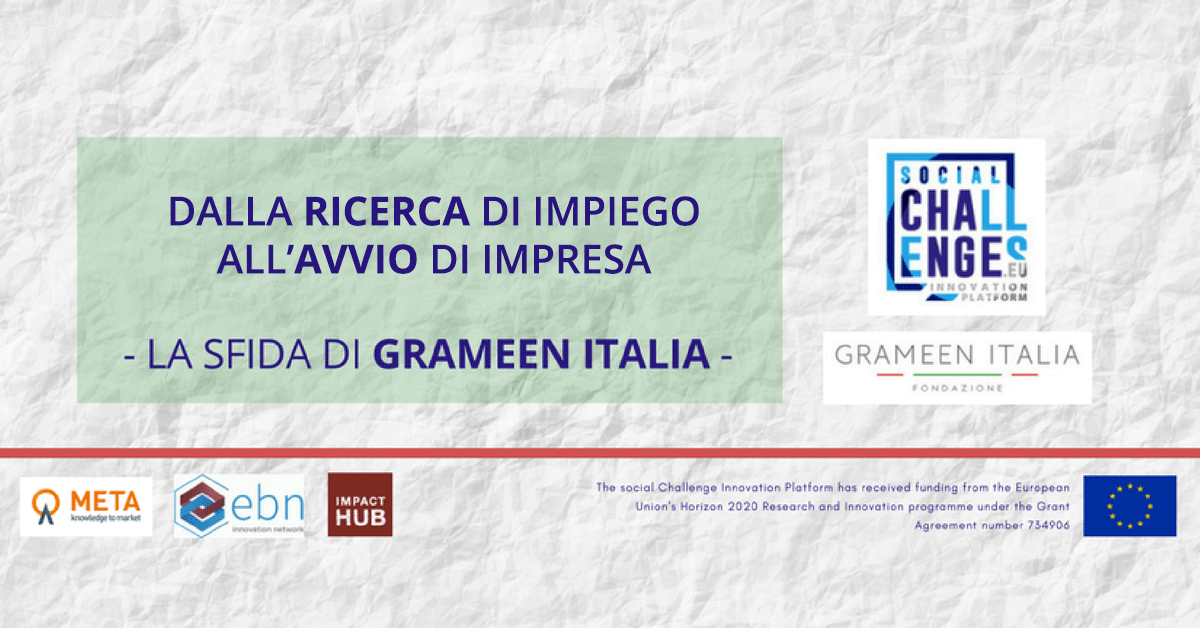
Specifically, the target group is formed by long-term unemployed, migrants, women, young NEETs – Not engaged in Education, Work or Training – who are living in the Metropolitan City of Bologna.
The challenge is addressed at Start-ups, Social Enterprises and Non-profit Organizations dedicated to the social services provision and the implementing of job placement programs dedicated to the target group, who are profoundly interested in designing and setting services that are able to stimulate and support entrepreneurial initiatives.
A €30,000 grant will be given to the proposers of the best solution to the challenge, up to a maximum of three winners. The loan will be disbursed in two separate tranches: 80% will be awarded in advance and the remaining 20% at the end of a six-month period. Furthermore, Grameen Italia Foundation will support the implementation of the solution with a support and monitoring program.
The socio-economic context
The changes that have long crossed the global economy have profoundly affected the labour market, society, local communities and people. These changes act on real opportunities that people have of managing their economic autonomy.
The increasing liberalization and flexibilisation of the labour market, in fact, no longer ensures the stability of employment contracts, especially for the most disadvantaged sections of the population.
Therefore, people who are looking for an income, regardless of the possession of a degree, are called to develop new skills, primarily to strengthen their ability to adapt. For this reason, a training course aimed at developing self-entrepreneurship skills and starting a business represents an extremely important opportunity for those with fewer guarantees.
Always aiming at encouraging the social and economic development of the weakest sections of the population, Grameen Italia Foundation proposes, through the challenge “From job seekers to job creators”, to overcome the limits of a typical job placement program, which is often temporary and not resolutive, focusing instead on the development of their own business.
The European platform
The Social Challenges Innovation Platform receives fundings from the European Horizon 2020 Research and Innovation programme and it is coordinated by META with the support of the European BIC Network (EBN) and Impact Hub, and in Italy it is promoted by Aster.
Social Challenges Innovation Platform is an online environment where Public, Private and Third Sector Stakeholders can upload social and environmental challenges to receive innovative solutions from European innovators, start-ups and SMEs. The Platform looks for scalable solutions able to meet these challenges and needs, and with the potential to access new markets by the end of the grant and mentoring programme.
According to the platform-based language, Grameen Italia Foundation is a “Challenge Owner”: an organization that, after having met a salient problem on the territory, transforms it in an opportunity of change and opens a call for projects dedicated to its resolution.
Instead, those who are presenting the projects are called “Solution Providers”.
How to parteipate?
The text of the regulation is online.
Start-ups, companies and non-profit organizations can apply as Solution Providers. Solution Providers may take part individually or in a partnership with a maximum of 3 other organizations. For applications with at least two organizations, the appointment of a Coordinator is required.
The steps to participate are:
- Create an account on the Socialchallenges.eu platform.
- Upload your proposal (written in the points required by the regulation on page 7)
- Wait for the proposal’s eligibility assessment (criteria on page 8 of the regulation)
- Once the proposal is accepted, wait for the winners to be elected (criteria and score on page 9 of the regulation)
For any doubt or request, contact us at info@grameenitalia.it.
Teaching Social Business, I and II edition
Teaching Social Business, I and II edition: Promoting Social Business in Secondary schools of the Emilia Romagna region, I and II ed.
(2014-2016) finished project.
The project aims at promoting and spreading the model of Social Business developed by professor M. Yunus, 2006 Nobel Peace Prize winner, among Secondary school students of Emilia Romagna. Through theory and practice that praise self-entrepreneurship, the project stimulates the students’ creative process of solving social problems within the Community, the development of personal skills and the analysis of innovative business models. This way, efforts are made towards preventing, overcoming and transforming the status of passiveness, exclusion and marginalization expressed with the acronym “NEET generation” (i.e. Not in Education, Employment or Training),
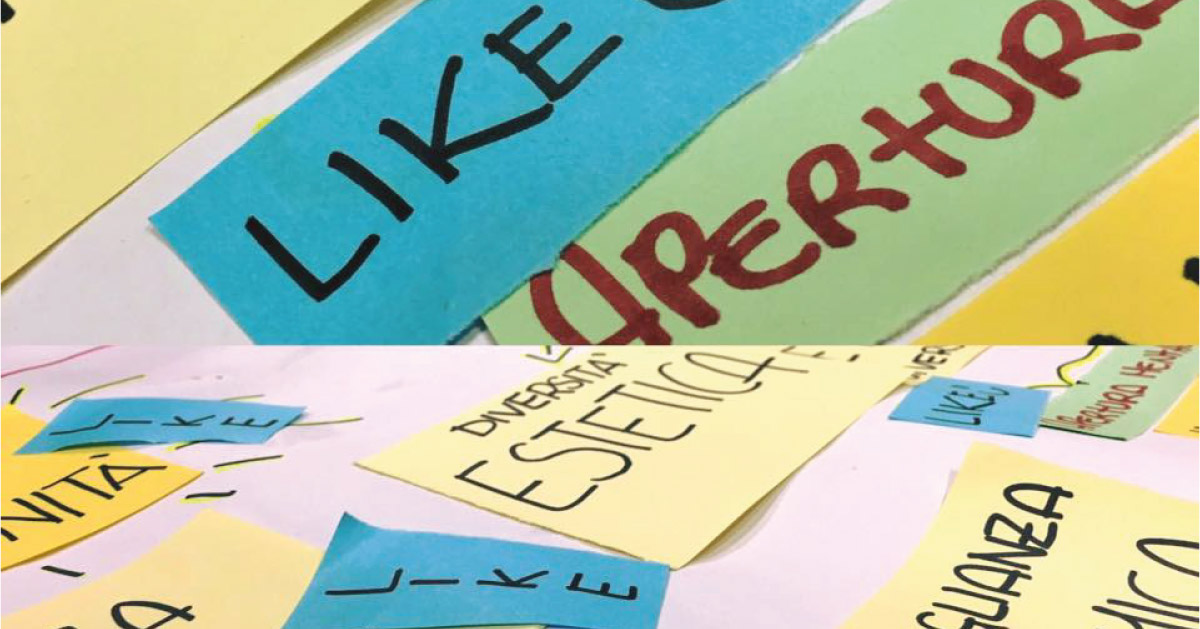
through specific training courses, capable of providing a complex view of reality, considering, other than business aspects per se, also social, psychological, relational and cultural implications. The relevance of the proposition is underlined by the philosophy it is founded on, a paradigm that follows alternative models to the “homo oeconomicus”; these models call for the direct participation of young people as active and aware citizens, operators of change.
The training experience.
The training experience was born as an extracurricular proposal and it encourages voluntary student participation, however, at the request of teachers, the course can be included in the regular study curriculum.
The didactic method is experiential, it includes active lessons and practical exercises (project work, surveys, and field surveys) by providing participants with both conceptual space for processing and operational tools needed to enhance their personal resources and capabilities.
At the end of the training there is a final competition: the Social Business event. Students are invited to submit Social Business projects developed during the training course. The best ideas will be evaluated and awarded by a committee of experts.
Thanks to the support of the Regional School Office, the training experience has been extended to all the schools in the region, involving over two years more than 700 students and 18 school institutions.
The training experience was included in the Alternanza Scuola-Lavoro program under the “La Buona Scuola” (107/2015) reform.
Supervisor: Prof. Luisa Brunori
Tutors: Chiara Bleve, Giorgia Bonaga, Luigi De Donno, Carmen Di Benedetto, Sofia Pesci, Sonia Ronsini




